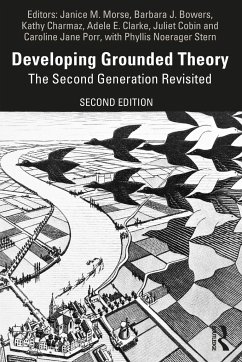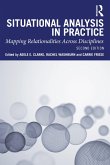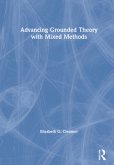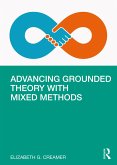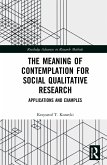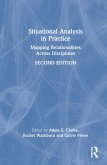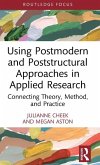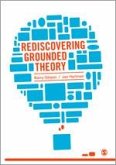Developing Grounded Theory: The Second Generation Revisited is a highly accessible description of the rapid development of grounded theories and the latest developments in grounded theory methods.
A succinct overview of the development of grounded theory is provided, including the similarities and differences between Glaserian and Straussian grounded theory. The method introduced by Schatzman, and the development of Charmaz's constructivist grounded theory and Clarke's situational analysis, are clearly presented. The book is divided into seven sections: each type of grounded theory is discussed by the developer (or their student), followed by a chapter describing a project that used that particular type of grounded theory. Bookending these chapters is the first chapter, which describes the development and landscape of grounded theory, and a final chapter describing the challenges to the future of grounded theory.
This book is ideally suited for beginning students trying to come to grips with the field as well as more advanced researchers attempting to delineate the major types of grounded theory.
A succinct overview of the development of grounded theory is provided, including the similarities and differences between Glaserian and Straussian grounded theory. The method introduced by Schatzman, and the development of Charmaz's constructivist grounded theory and Clarke's situational analysis, are clearly presented. The book is divided into seven sections: each type of grounded theory is discussed by the developer (or their student), followed by a chapter describing a project that used that particular type of grounded theory. Bookending these chapters is the first chapter, which describes the development and landscape of grounded theory, and a final chapter describing the challenges to the future of grounded theory.
This book is ideally suited for beginning students trying to come to grips with the field as well as more advanced researchers attempting to delineate the major types of grounded theory.
"Students of grounded theory methodology will be delighted by this rare opportunity to be a fly on the wall for the dialogues and debates that went into the modern incarnations of this much loved qualitative research tradition.
In this text, Morse and the second generation grounded theory design developers allow us a rare glimpse of the makings of qualitative methodology as it has evolved to meet the needs of an increasingly diversified scholarly audience.
Before embarking on a grounded theory inquiry adventure, it is wise to understand where the methodology came from and why its structures and practices have evolved into the diversity of approaches we know today. This text allows readers to join in the original conversations and to follow along with their developments over time as scholars across a range of disciplines have found ways to adapt the classic tradition into the widely applicable qualitative research approach we know today." -- Sally Thorne, Professor, University of British Columbia, Canada
"The second edition of this book demonstrates how the field of Grounded Theory research and methodology has been developed by the second generation of researchers. It offers many very helpful insights into the progress of the methodology, and into very instructive first-hand examples of research. It illustrates the variety of approaches in using Grounded Theory methodology for research in several fields. This makes the book an invaluable resource for researchers and students at the same time." -- Uwe Flick, Professor, Freie Universität Berlin, Germany
"A method is like a shark, it must keep moving forwards or it dies. Or as Anselm Strauss, writing with Julie Corbin, observed "a child once launched is very much subject to a combination of its origins and the evolving contingencies of life. Can it be otherwise with a methodology?"
Since its inception in the 1960s, the grounded theory method [GTM] has been exemplary both in moving forwards and in responding to the evolving contingencies of more than half a century. Nowhere is this better demonstrated than in the work of the 'second generation' of grounded theorists in whose hands GTM has flourished and developed, resulting in a constellation of styles or variants, all derived from the founding texts, but now offering an armamentarium accessible and available to researchers as they develop their own methodological sensitivities across a wide spectrum of disciplines.
This revised edition, evolving from the 2007 'Grounded Theory Bash', underlines the contributions of this exceptional group, incorporating individual chapters on the various distinctive approaches, each further illustrated with a selected example of its use. The result is a comprehensible and immensely valuable addition to the GTM literature." -- Antony Bryant, Professor of Informatics, Leeds Beckett University, UK
In this text, Morse and the second generation grounded theory design developers allow us a rare glimpse of the makings of qualitative methodology as it has evolved to meet the needs of an increasingly diversified scholarly audience.
Before embarking on a grounded theory inquiry adventure, it is wise to understand where the methodology came from and why its structures and practices have evolved into the diversity of approaches we know today. This text allows readers to join in the original conversations and to follow along with their developments over time as scholars across a range of disciplines have found ways to adapt the classic tradition into the widely applicable qualitative research approach we know today." -- Sally Thorne, Professor, University of British Columbia, Canada
"The second edition of this book demonstrates how the field of Grounded Theory research and methodology has been developed by the second generation of researchers. It offers many very helpful insights into the progress of the methodology, and into very instructive first-hand examples of research. It illustrates the variety of approaches in using Grounded Theory methodology for research in several fields. This makes the book an invaluable resource for researchers and students at the same time." -- Uwe Flick, Professor, Freie Universität Berlin, Germany
"A method is like a shark, it must keep moving forwards or it dies. Or as Anselm Strauss, writing with Julie Corbin, observed "a child once launched is very much subject to a combination of its origins and the evolving contingencies of life. Can it be otherwise with a methodology?"
Since its inception in the 1960s, the grounded theory method [GTM] has been exemplary both in moving forwards and in responding to the evolving contingencies of more than half a century. Nowhere is this better demonstrated than in the work of the 'second generation' of grounded theorists in whose hands GTM has flourished and developed, resulting in a constellation of styles or variants, all derived from the founding texts, but now offering an armamentarium accessible and available to researchers as they develop their own methodological sensitivities across a wide spectrum of disciplines.
This revised edition, evolving from the 2007 'Grounded Theory Bash', underlines the contributions of this exceptional group, incorporating individual chapters on the various distinctive approaches, each further illustrated with a selected example of its use. The result is a comprehensible and immensely valuable addition to the GTM literature." -- Antony Bryant, Professor of Informatics, Leeds Beckett University, UK

